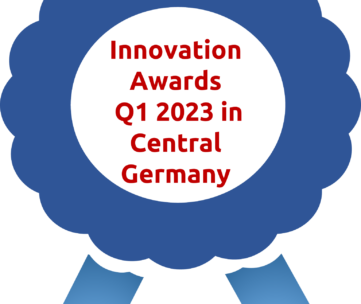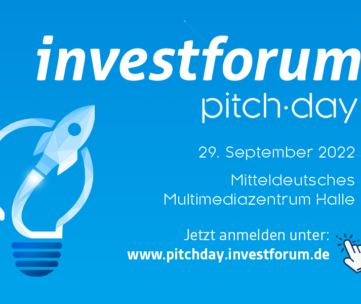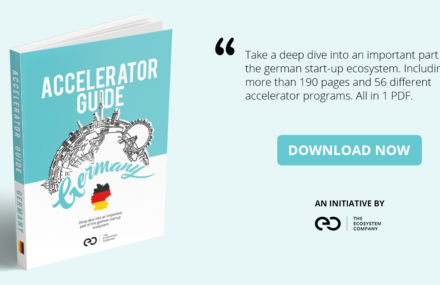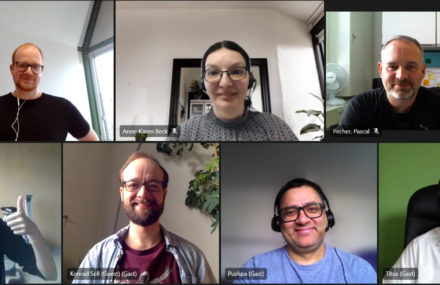
Content Marketing for Startups – Interview with Caroline Hof
Why is Content Marketing so important? And what should founders and startups pay attention to when they engage in Content Marketing?
German version below.
Caroline Hof, could you tell us a little bit about yourself and your background? How did you get involved in online marketing/social media?
My name is Caroline Hof, I live and work as an independent digital strategist in Munich. With my company Hof Digital Marketing & Strategy, I advise startups, small and medium-sized companies from the IT and technology sector in digital marketing, with a focus on content marketing, LinkedIn marketing and social media. How did I get into online marketing and social media? I’ve always had an affinity for the digital world and social media. As a pupil and student, I was on Uboot, Myspace or StudiVZ, the forerunners of today’s social media. I was active on Facebook, the “mother” of today’s social networks, even before it became popular in Germany.
In addition to the online world, I am also passionate about languages and communication. I studied linguistics and literature and went into public relations after graduating. When I started as a PR consultant 10 years ago, social media and corporate blogs were also becoming more and more widespread in public relations and marketing. In different PR agencies, I helped clients – mainly from IT and technology – to use digital channels such as their own website, social media, newsletters or blogs for communication and marketing, in addition to classic PR. Before I started my own business in 2019, I worked for a content marketing agency for almost five years, supporting clients from the healthcare, life sciences and technology sectors.

Content marketing is still my consulting focus today – closely linked to digital marketing and social media. For me, content marketing is still the best and most sustainable way for a company to make itself visible to its target groups, gain their trust and retain them as customers in the long term. We are inundated with so much content every day that only those companies that know their target groups well and offer them useful content are able to get through to them.
“Don’t start without a plan…founders should research where their target groups are, where they can get into conversation with them. Otherwise, a lot of money and time may be invested in the wrong channel.“
Caroline Hof
Which channels are currently the most successful ones for founders?
That can’t be said as a general rule. The individual goals and target groups determine which channel a founder should use for digital marketing. As a founder, I should be present wherever my target groups are. However, if you want to address B2B target groups, I recommend being active on the business network LinkedIn. LinkedIn has become one of the most important content and exchange platforms in B2B, especially in the recent years. With a well thought-out content strategy a lot can be achieved organically – i.e. without advertising. But here, as on every other platform, the same applies: Don’t start without a plan.
I only have a chance of attracting the attention of my target groups if I have thought about and researched in advance the topics, formats and content that will best reach them and the best time to reach them. Depending on the target groups, Twitter, Facebook, Instagram – or classic press relations – can also be suitable channels in addition to LinkedIn. For founders in biomedical and life sciences, ResearchGate is also recommended. First and foremost, founders should research where their target groups are, where they can get into conversation with them. Otherwise, a lot of money and time may be invested in the wrong channel, and the content may not reach the target groups. It is also important to start small, i.e., to concentrate on one channel first. There you can test topics, formats and content. And what works can then be expanded and transferred to other channels.

A social media or marketing presence is a figurehead of companies/startups. What should founders pay attention to?
Founders should not get started without a plan. As already mentioned, the target groups decide on which channel an appearance is worthwhile for companies/startups. Therefore, a deep target group and topic research is key: Who are my target groups, keyword personas? Where do I find them? What topics are they interested in? Which formats? What do they talk about? When are they on the channel, when can I reach them there? Only when I have this information I can address my target groups accordingly. In addition to the right content, a well thought-out content strategy and set milestones, a fully completed and up-to-date social media profile is also important. It is the “digital business card”. If a potential customer finds me on LinkedIn, for example, he first lands on my personal profile or on the company profile. And the first digital impression should also be as positive as possible.

On LinkedIn, it is worth it to create and completely fill out a company profile and personal profiles of the employees or at least the managing director and the communications or marketing managers. A company profile offers even more marketing opportunities than a personal profile: For example, it can be used for advertising and there are more analysis functions than with a personal profile. Personal profiles, on the other hand, get more reach on LinkedIn because the network primarily wants to promote personal exchange among its members and keep people on the platform for a long time. That’s why I recommend using both types of profiles – company profile and personal profiles – for digital marketing and combining them with each other.
Do you have a personal recipe for success?
My personal recipe for success is actually quite simple: don’t proceed without a plan, always keep an eye on the target groups and test a lot. As I said, without a plan it can happen that I rely on the wrong measures and content. And waste a lot of time and resources. But if I keep my target groups in mind, I increase my chances of success. And that’s what content marketing is all about: Unlike traditional marketing, content marketing always focuses on the target groups. Classic advertising tends to be “market shouting,” puts products and services in the center, and takes the corporate perspective.
Content marketing turns the tables: How can I help my target groups? What problems do they have? With content, I provide the appropriate answers, help them further, exchange ideas with my target groups. And in this way, I draw their attention to me. Thus, I slowly build up trust and show myself as an expert and problem solver in the area in which I could help them with my content. From experience from customer projects, but also as a self-employed person, I can say: This approach works! If you test a lot from the beginning, you soon know very well what works. It does take a while to win the first customers. After all, trust doesn’t develop overnight. But once you’ve won their trust, it can lead to long-lasting, loyal customer relationships. And customers even become fans who recommend you to others.
“The Weinberg Campus Accelerator is very valuable and I would have wished for something like this myself as a founder.“
Caroline Hof
You worked as an expert for content marketing and social media at the Weinberg Campus Accelerator. What makes the program so special in your opinion and why should startups apply?
What excites me most about the Weinberg Campus Accelerator program is that it is so varied and broad-based and covers so many different areas of knowledge. The founders can, for example, be trained in topics such as business development, quality management, sales, marketing and communication. They are given the most important basics and are coached to grow and to implement their ideas quickly and independently. At the same time, the program is also very much tailored to their professional requirements as founders from the biomedical and life sciences sectors. And the startup community should not be underestimated. Mutual exchange among founders is very important, especially in the startup phase. I find this offer very valuable and I would have wished for something like this myself as a founder, even though I naturally come from a different field.
What other advice would you like to give to founders?
As a founder, I can only encourage the startups and founders of the Weinberg Campus Accelerator to believe in their ideas, to stick to their vision, even if things don’t go as expected. In the last one and a half years since my founding, I myself have had moments when unexpected situations arose, I had to change plans spontaneously, and I would have liked to just give up. Such moments are part of it, you grow from them and learn from them.
The most important thing is to reflect on what went wrong, why you’re dissatisfied or why you’re not getting anywhere, learn from it – and then refocus. In such moments, it helped me to exchange ideas with other founders. The view from the outside and the experiences of other founders in a similar situation can be very enriching. Also reminding myself of my “big vision”, of my goals in a few years was very important to continue. This motivates me and helps me to move forward, even when there are setbacks.
Find Caroline Hof on Social Media
Weinberg Campus Accelerator on Social Media
German version:
Warum ist Content Marketing so wichtig? Und worauf sollten Gründer*innen und Startups achten, wenn sie sich Content Marketing widmen?
Caroline Hof, können Sie sich und Ihre Arbeit bitte kurz vorstellen. Wie kamen Sie zum Thema „Online Marketing/Social Media“?
Mein Name ist Caroline Hof, ich lebe und arbeite als selbstständige Digitalstrategin in München. Mit meinem Unternehmen Hof Digital Marketing & Strategy berate ich Startups, kleine und mittlere Unternehmen aus dem IT- und Technologie-Bereich im digitalen Marketing, schwerpunktmäßig im Content Marketing, LinkedIn Marketing und Social Media. Wie bin ich zu Online-Marketing und Social Media gekommen? Ich hatte immer schon ein Faible für die digitale Welt und soziale Netzwerke. Als Schülerin und Studentin war ich auf Uboot, Myspace oder StudiVZ unterwegs, den Vorreitern heutiger Social Media. Auf Facebook, der “Mutter” heutiger sozialer Netzwerke, war ich aktiv, noch bevor es in Deutschland populär wurde.
Neben der Onlinewelt begeistern mich auch Sprachen und Kommunikation. Ich habe Sprach- und Literaturwissenschaften studiert und bin nach dem Studium in die Public Relations gegangen. Als ich vor 10 Jahren als PR-Beraterin startete, verbreiteten sich Social Media und Corporate Blogs auch immer mehr in der Öffentlichkeitsarbeit und im Marketing. In unterschiedlichen PR-Agenturen habe ich Kunden – schwerpunktmäßig aus IT und Technologie – neben klassischer PR dabei unterstützt, digitale Kanäle wie die eigene Website, Social Media, Newsletter oder Blogs für Kommunikation und Marketing zu nutzen. Bevor ich 2019 in die Selbstständigkeit gestartet bin, habe ich in einer Content-Marketing-Agentur knapp fünf Jahre Kunden aus den Bereichen Healthcare, Life Sciences und Technology betreut.

Content Marketing ist auch heute noch mein Beratungsschwerpunkt – eng verknüpft mit digitalem Marketing und Social Media. Für mich ist Content Marketing nach wie vor der beste und nachhaltigste Weg, um sich als Unternehmen bei seinen Zielgruppen sichtbar zu machen, ihr Vertrauen zu gewinnen und sie als Kunden langfristig zu halten. Wir werden jeden Tag mit so vielen Inhalten überflutet, da dringen nur noch diejenigen Unternehmen zu ihren Zielgruppen durch, die sie gut kennen und ihnen nützliche Inhalte bieten.
“Nicht ohne Plan starten…Gründer sollten zuallererst recherchieren, wo ihre Zielgruppen unterwegs sind, wo sie mit ihnen ins Gespräch kommen. Sonst ist unter Umständen viel Geld und Zeit in den falschen Kanal investiert“
Caroline Hof
Welche Kanäle sind momentan für Gründer am erfolgreichsten?
Das lässt sich so pauschal nicht sagen. Auf welchem Kanal man als Gründer unterwegs sein sollte, entscheiden die individuellen Ziele und Zielgruppen. Dort, wo sich meine Zielgruppen aufhalten, sollte auch ich als Gründer, als Unternehmen präsent sein. Wer B2B-Zielgruppen ansprechen möchte, dem empfehle ich aber, auf dem Businessnetzwerk LinkedIn aktiv zu sein. LinkedIn hat sich besonders in den letzten Jahren zu einer der wichtigsten Content- und Austauschplattformen im B2B entwickelt. Mit einer gut durchdachten Content-Strategie lässt sich hier auch organisch – das heißt, ohne Werbung zu schalten – aktuell noch viel erreichen. Aber auch hier gilt, wie auf jeder anderen Plattform: Nicht ohne Plan starten.
Nur wenn ich mir vorher überlegt und recherchiert habe, mit welchen Themen, Formaten und Inhalten ich meine Zielgruppen wann am besten erreiche, habe ich auch eine Chance, sie auf mich aufmerksam zu machen. Je nach Zielgruppen können neben LinkedIn aber auch Twitter, Facebook, Instagram – oder die klassische Pressearbeit – passende Kanäle sein. Für Gründer aus Biomedical und Life Sciences ist auch ResearchGate zu empfehlen. Gründer sollten zuallererst recherchieren, wo ihre Zielgruppen unterwegs sind, wo sie mit ihnen ins Gespräch kommen. Sonst ist unter Umständen viel Geld und Zeit in den falschen Kanal investiert, die Inhalte erreichen die Zielgruppen nicht. Wichtig ist auch, erstmal schlank zu starten, das heißt, sich zunächst auf einen Kanal zu konzentrieren. Dort lassen sich Themen, Formate und Inhalte austesten. Und was funktioniert, baut man dann weiter aus und überträgt es auch auf andere Kanäle.

Social Media bzw. Marketing Auftritte sind ein Aushängeschild von Unternehmen/Startups. Worauf sollten die Gründer am meisten achten/wert legen?
Ohne Plan sollten Gründer nicht loslegen. Wie schon gesagt, entscheiden die Zielgruppen, auf welchem Kanal sich ein Auftritt für Unternehmen/Startups lohnt. Deshalb ist eine gründliche Zielgruppen- und Themenrecherche entscheidend: Wer sind meine Zielgruppen, Stichwort Personas? Wo finde ich sie? Welche Themen interessieren sie? Welche Formate? Worüber sprechen sie? Wann sind sie auf dem Kanal unterwegs, wann erreiche ich sie dort? Nur wenn ich diese Informationen habe, kann ich meine Zielgruppen auch richtig ansprechen. Neben den passenden Inhalten, einer durchdachten Content-Strategie und gesetzten Meilensteinen ist auch ein vollständig ausgefülltes und aktuelles Social-Media-Profil wichtig. Es ist die „digitale Visitenkarte“. Wird ein potenzieller Kunde beispielsweise auf LinkedIn auf mich aufmerksam, landet er erstmal auf meinem persönlichen Profil oder auf dem Unternehmensprofil. Und der erste Eindruck sollte auch digital möglichst positiv sein.

Auf LinkedIn lohnt es sich, ein Unternehmensprofil und persönliche Profile der Mitarbeiter bzw. mindestens des Geschäftsführers und den Kommunikations- beziehungsweise Marketingverantwortlichen anzulegen und vollständig auszufüllen. Ein Unternehmensprofil bietet im Vergleich zu persönlichen Profilen sogar noch mehr Möglichkeiten fürs Marketing: Beispielsweise lässt sich darüber auch Werbung schalten und es gibt mehr Analyse-Funktionen als beim persönlichen Profil. Persönliche Profile wiederum bekommen auf LinkedIn mehr Reichweite, da das Netzwerk vor allem den persönlichen Austausch seiner Mitglieder fördern und die Menschen lange auf der Plattform halten möchte. Deshalb empfehle ich, beide Profil-Arten – Unternehmensprofil und persönliche Profile – für das digitale Marketing zu nutzen und miteinander zu kombinieren.
Haben Sie ein persönliches Erfolgskonzept?
Mein persönliches Erfolgskonzept ist eigentlich recht simpel: Nicht ohne Plan vorgehen, immer die Zielgruppen im Blick behalten und viel testen. Wie schon gesagt, ohne Plan kann es passieren, dass ich auf die falschen Maßnahmen und Inhalte setze. Und damit einiges an Zeit und Ressourcen verschwende. Habe ich aber bei allem meine Zielgruppen im Hinterkopf, erhöhe ich meine Erfolgschancen. Und genau das macht Content Marketing aus: Im Gegensatz zum klassischen Marketing, fokussiert Content Marketing sich immer auf die Zielgruppen. Klassische Werbung ist eher „marktschreierisch”, stellt Produkte und Dienstleistungen ins Zentrum und nimmt die Unternehmensperspektive ein.
Content Marketing dreht den Spieß um: Wie kann ich meinen Zielgruppen weiterhelfen? Welche Probleme haben sie? Mit Inhalten liefere ich die entsprechenden Antworten, helfe weiter, tausche mich mit meinen Zielgruppen aus. Und mache sie so auf mich aufmerksam. Damit baue ich langsam Vertrauen auf und zeige mich als Experte und Problemlöser in dem Gebiet, in welchem ich ihnen mit meinen Inhalten weiterhelfen konnte. Aus Erfahrung aus Kundenprojekten, aber auch als Selbstständige kann ich sagen: Dieser Ansatz wirkt! Wer von Anfang an viel testet, weiß bald sehr genau, was funktioniert. Es dauert zwar eine Weile, bis man die ersten Kunden gewinnt. Denn Vertrauen entsteht nicht von heute auf morgen. Aber hat man das Vertrauen erst einmal gewonnen, können daraus langjährige, loyale Kundenbeziehungen entstehen. Und die Kunden werden sogar zu Fans, die einen weiterempfehlen.
“Der Weinberg Campus Accelerator ist sehr wertvoll und ich hätte mir so etwas selbst als Gründerin gewünscht.“
Caroline Hof
Sie waren als Expertin für Content Marketing und Social Media beim Weinberg Campus Accelerator tätig. Was macht das Programm Ihrer Meinung nach so besonders und warum sollten sich Startups bewerben?
Am Programm des Weinberg Campus Accelerator begeistert mich vor allem, dass es so abwechslungsreich und breit aufgestellt ist und so viele unterschiedliche Wissensgebiete abdeckt. Die Gründer können sich beispielsweise zu Themen wie Geschäftsentwicklung, Qualitätsmanagement, Vertrieb, Marketing und Kommunikation fortbilden. Sie bekommen die wichtigsten Grundlagen an die Hand und werden gecoacht, um ihre Ideen schnell und eigenständig umzusetzen und weiter zu wachsen. Gleichzeitig ist das Programm aber auch sehr stark auf ihre fachlichen Anforderungen als Gründer aus dem Biomedical und Life Sciences zugeschnitten. Und nicht zu unterschätzen ist auch die Startup-Community. Gegenseitiger Austausch unter Gründern ist gerade in der Startphase sehr wichtig. Dieses Angebot in Kombination finde ich super und ich hätte mir so etwas selbst als Gründerin gewünscht, auch wenn ich natürlich aus einem anderen Bereich komme.
Welchen Tipp möchten Sie Gründern noch mit auf den Weg geben?
Als Gründerin kann ich die Startups und Gründer des Weinberg Campus Accelerator nur ermutigen, an ihre Ideen zu glauben, an ihrer Vision festzuhalten, auch wenn es mal nicht so läuft wie erwartet. Ich selbst habe in den letzten eineinhalb Jahren seit meiner Gründung immer mal wieder Momente gehabt, in denen unerwartete Situationen auftauchten, ich Pläne spontan ändern musste und am liebsten alles hingeworfen hätte. Solche Momente gehören dazu, man wächst daran und lernt daraus.
Das Wichtigste ist, zu reflektieren, was schief gelaufen ist, warum man unzufrieden ist oder warum man nicht weiterkommt, daraus zu lernen – und sich dann wieder neu zu fokussieren. In solchen Momenten hat es mir geholfen, mich mit anderen Gründern auszutauschen. Der Blick von außen und die Erfahrungen anderer Gründer in einer ähnlichen Situation kann sehr bereichern. Wichtig um weiterzumachen war auch, mich an meine „große Vision“ zu erinnern, an meine Ziele in ein paar Jahren. Das motiviert und hilft mir vorwärts zu gehen, auch wenn es mal Rückschläge gibt.
Caroline Hof auf Social Media
Weinberg Campus Accelerator auf Social Media









